Jamie Erickson’s books are frequently recommended in homeschool circles, but it wasn’t until several months ago that I read one of hers for the first time! I knew as soon as I finished it that Jamie would be a wonderful podcast guest, and am delighted to share our conversation with you all today. We don’t have to homeschool in fear. Learn how to homeschool bravely in today’s homeschool conversation episode!
Be sure to check out all the other interviews in our Homeschool Conversations series!
Watch the video. Listen to the podcast. Read the show notes. Share with your friends!
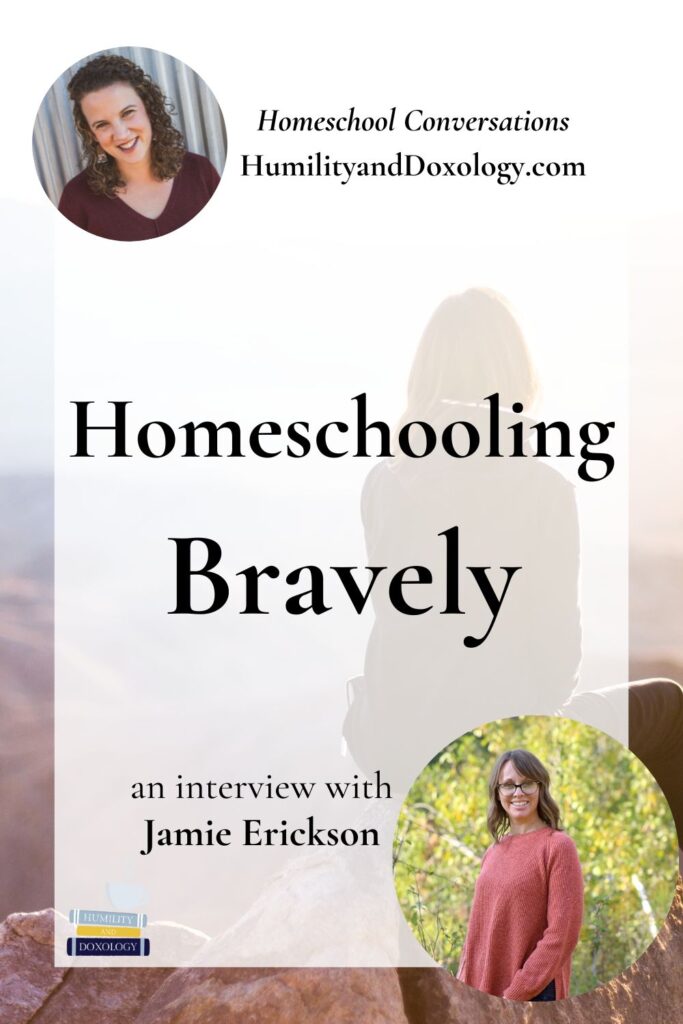
{This post contains paid links. Please see disclaimer.}
Who is Jamie Erickson
When she’s not curating memories, hoarding vintage books, or homeschooling her five kids, Jamie can be found encouraging and equipping a growing tribe of mothers all across the globe on the Mom to Mom Podcast, through her blog, The Unlikely Homeschool, in national conferences, and in her books, Homeschool Bravely: How to Squash Doubt, Trust God, and Teach Your Child with Confidence, and her new book, Holy Hygge.
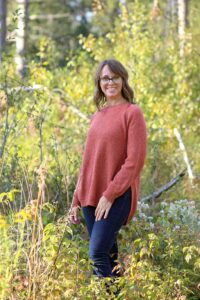
Watch my Homeschool Conversation with Jamie Erickson
Prefer to listen to your content? Subscribe to Homeschool Conversations on Apple podcasts or wherever you get your podcasts so you don’t miss a single episode!
Amy Sloan: Hello, friends. Today, I am joined by Jamie Erickson. When she’s not curating memories, hoarding vintage books, or homeschooling her five kids, Jamie can be found encouraging and equipping a growing tribe of mothers all across the globe on the Mom to Mom Podcast, through her blog, The Unlikely Homeschool, and national conferences, and in her books, Homeschool Bravely: How to Squash Doubt, Trust God, and Teach Your Child with Confidence, and her new book, Holy Hygge. Jamie, thank you so much for joining me today.
Jamie Erickson: I’m happy to be here. Thanks for having me.
Amy: After reading the official bios, I always love to give guests a chance to just introduce themselves and tell us a little bit about yourself, your family, and how you got started homeschooling.
Jamie: As you had said, I am married. I’ve been married to my college sweetheart for 20 years. We do have five kids. We actually launched our first about two years ago. We still currently have two in high school, one in middle school, and one little caboose in elementary school that keeps us really busy. He’s quite the extrovert. We got started homeschooling because my husband was homeschooled back in the ’80s and ’90s. I was a trained teacher in the classroom when we got married. I had absolutely no idea that I would ever homeschool. It wasn’t on my radar. I would actually say I didn’t want to homeschool. Who even does that? That’s so weird.
All the things that you say sometimes even before you have kids, it’s interesting how you can make your plans, but the Lord will direct your steps. That’s how I fell into it. I was really challenged by my mother-in-law to consider homeschooling. It really wasn’t until I had my first child that I was like, “I think I might consider it.” I remembered what it was like in the classroom and I got to see the underbelly of what the school system is like, and I knew that while I don’t regret that experience and I know that it’s a needed thing and I’m grateful that we have free public education for those who need it, I knew that I wanted something different for my kids.
Amy: I love to hear your story. I didn’t realize that your husband is a second-generation homeschooler. I am as well. I was homeschooled through graduation, and then my husband was homeschooled after the seventh grade. At least we both came in with some backgrounds of experience. We both had a positive experience and so I can imagine it would be a little bit potentially more tricky if one of you had had past homeschool experience and the other had not.
How did that then play out? As you thought, “Maybe I’ll give this a try,” how did your approach to home education grow and change over the years?
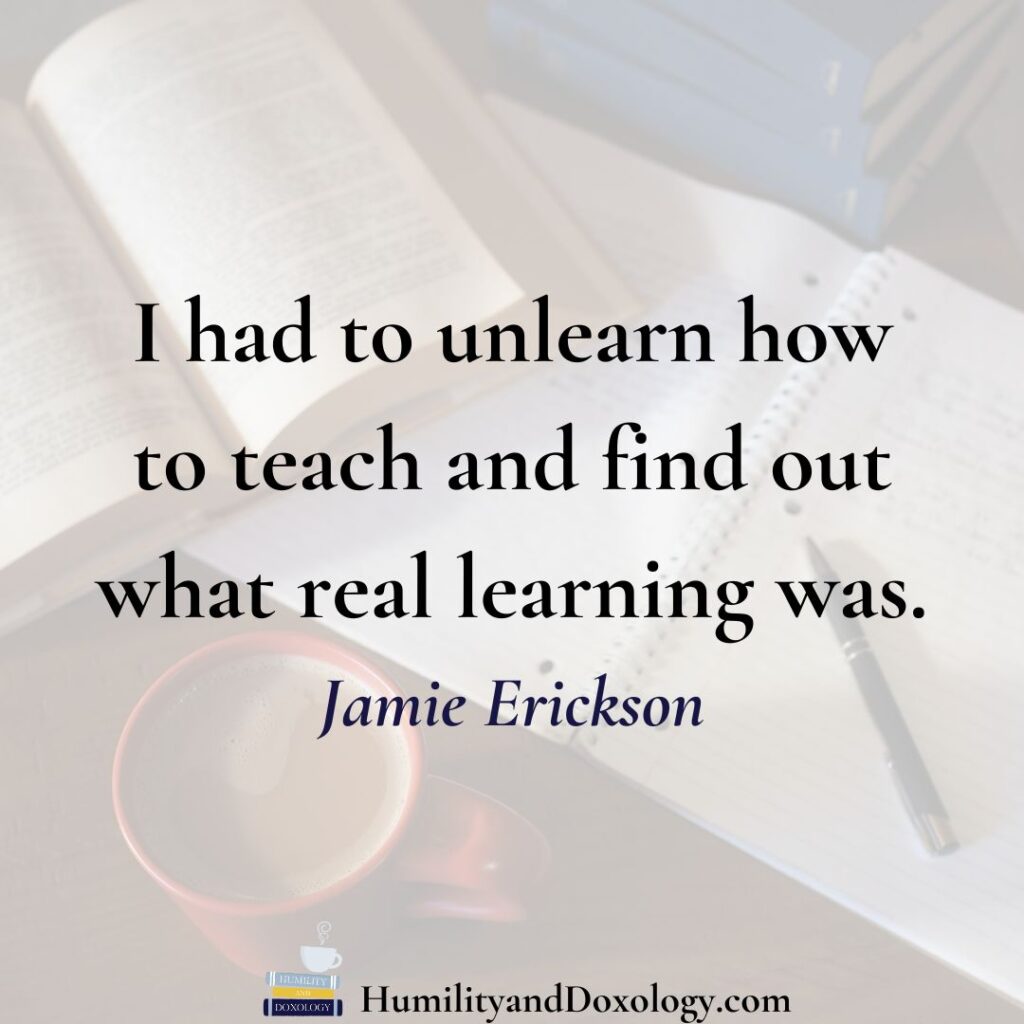
Finding out what real learning looks like
Jamie: I started out really eclectic from the very beginning. I’ve always thought that every homeschool curriculum is great, but it’s really only great for certain subjects or for certain kids. I’ve always piecemealed together a random collection of things for my kids. I think what has changed over the years is I’ve really learned to let go a lot. Because I was a trained teacher, you naturally take on a certain mindset of what you think education is supposed to be. You’re conditioned to believe learning can only look one way. Sitting at a desk, facing the front, the teachers at the front, the big talking head giving out, dispersing all the information. Really that’s just school.
That has very little to do with real learning and real education. I had to unlearn how to teach and find out what real learning was. I began to let go of a lot of things that at one time I thought were so important. I also think that I have learned to allow non-traditional forms of learning to count. I think as moms, we think that it has to look formal, it has to be measurable, it has to be documentable to count, but real learning can look a lot of different ways. If we’re inspiring our kids to be lifelong learners, they’re really learning all of the time through many different mediums.
That really is true learning when your everyday life and your school life run parallel to each other and you really have a one-piece life.
Amy: So much of what we are teaching and learning, like you were saying, it’s not measurable, but it’s the things that actually are most important for being a human, right?
Jamie: Right.
Amy: For growing into adulthood. Those character issues, those parenting things a lot of times can come to the fore in ways that we don’t expect, and you can’t write that on the list like we did this many math problems necessarily in that 30-minute time, but those are the things that are going to matter long-term. It’s really important with our kids.
Jamie: Even some of the things that are measurable. For instance, I just did a whole Civil War history unit with my three youngest, that’s measurable. I can make up a test and drill them on the facts, but a test isn’t real learning. It’s just a regurgitation of what has been learned. You actually don’t learn anything new in a test.
I think so often, we spend so much time on these school skills because we think that’s school. It is school, but it’s not actually education. Sometimes the learning is measurable, but that doesn’t necessarily mean we have to measure it.
Lifelong learning and curiosity
Amy: You brought up this difference between school and education. I think that is really a gift that we have in homeschooling. Are there any other parts of homeschooling that are some of your favorite things?
Jamie: I am a lifelong learner myself. I’ve always been a curious person. I have learned to be a beginner my whole life. It’s wonderful to be a beginner right alongside my kids. Homeschooling has been the re-education of myself, and that’s been wonderful to be able to do that right alongside them.
I love the fact that as a homeschooler, we get to set our own schedule, recognizing that we have 24 hours at our disposal to learn all the things. We don’t have to follow the 9:00 to 3:00 marching orders of somebody else’s drum. They’re beating that drum down the street, but we don’t have to march through it.
My husband and I both work from home, and we like to adventure on the school days. Because we homeschool, we can and we can bring all our kids along and it doesn’t have to upset everything. We don’t have to play a lot of catch-up.
I really value the fact that in homeschooling, I can be a proactive parent, not a reactive one. Like I said, I did get to see a lot of the underbelly of the traditional way, the agenda, the negative worldview influences, the lack of insight that some parents have to their kids because they have so few hours with them, and the crushing of personalities and passions in kids. I got to see all of those things up close and personal when I was in the classroom.
In homeschooling, I not only get to avoid many, if not all of those things, but I can spend my time proactively influencing them in my worldview. I don’t have to retrain ideologies and philosophies. It’s a lot harder to retrain than it is to train. I appreciate the fact that through homeschooling, everything that I do can be very proactive.
Amy: I think it’s so valuable too because as homeschoolers, we’re able to show that these subjects don’t come in these little boxes, right?
Jamie: Yes.
Amy: This isn’t like the history and the science and then the faith or the Bible, the theology as if they’re separate subjects. We’re really able to see how all of these things integrate together so beautifully in the world around us. That’s why a lot of times, you have overlap in the subjects you’re studying just naturally because you’re making those connections. It’s really exciting.
Jamie: Yes. Connecting the dots. Very cross-curricular learning, really tapping into the whole person, the holistic being, their physical self, their spiritual self, their emotional self, their mental self, it all just gets to be integrated across the curriculum.

Overcoming struggles of homeschooling
Amy: These are all some of the real gifts that homeschooling gives us, but it can come with a lot of challenges too. Sometimes the very things that make it so wonderful, like being with our children and seeing them as whole people, not just talking about their academics, sometimes those very good things can also be the challenges. Have there been any challenges you have faced in homeschooling? Then how have you sought to overcome those difficulties?
Jamie: I can think of two right off the bat. First and foremost, I’ve always had an allergy to math. Math and I do not get along. We don’t play nicely. We haven’t my entire life. In the early years, I was really fearful about homeschooling in the upper grades knowing– I can add, I can subtract, even do long division, although I’d rather eat a bag of hair than do long division if I could choose, but I knew that my kids would need some of that upper-level math.
That was a real fear that I had, but I have learned in the years that I don’t actually have to teach all the things to count myself as a homeschooler.
Homeschooling just means that I get to decide who teaches the thing, when it’s taught, how it’s taught, where it’s taught, and with what resources it’s taught. That’s still homeschooling. I have learned over the years to give myself the blessing and the gift of farming out math to people who know it better, love it more, and can teach it appropriately on the upper levels. I don’t feel the least fit guilty about that because it certainly makes my kids understand it more and enjoy it more. Actually, it helps to strengthen our relationship too. We don’t have to allow math to be the big elephant in the room. We don’t have to strong-arm each other during math time so I can still be mom the cheerleader. That’s the first one.
I think the second struggle has been I do have one child who is dyslexic. I won’t say severely, but pretty dyslexic. Learning has been a struggle for him. Every single victory has been hard won, but we’ve been homeschooling long enough that I can see how through some of that struggle, he has learned perseverance, he has learned faithfulness, he has learned stick-to-it-iveness and determination. All these character qualities that would’ve probably been missed had some of the learning not been a struggle.
He hopes to join the military someday. He’s not far away from that. He actually hopes to be a Navy SEAL, and I can’t think of a more useful skill than perseverance and sticktoitiveness, and faithfulness for a Navy SEAL. God knew exactly what this child needed. He has used even this child’s struggle to form him into exactly the person he needs to be to be able to do the will of God in his life. That has been a struggle, but it’s certainly not one that is one I’d wish away.
Amy: I appreciate you sharing that because I think sometimes when we think about the challenges either that we are facing as homeschool parents or we see a challenge our child is facing, and we can just define possibly the whole homeschool year or our homeschool “success,” whatever that means, or their future goals and things, we can define it by the challenge instead of seeing this challenge as something that is hard. We don’t have to be like, “It’s all fine,” in a fake way, but to see it as a gift.
What are we going to learn through this challenge that God can use in the future? I think that’s such a beautiful way to reframe it because it is a gift. It is on purpose from a good God who loves us and knows us best and knows our children best. To be able to see that as a potential for growth instead of just something that’s a drudgery I think is a really great perspective.
Jamie: I think the other thing that we need to remember is if our kids have a struggle, specifically a learning struggle, an academic struggle, they would still have those struggles down the street at a brick-and-mortar school. In addition to that, they would have some of the social pressures and anxiety that comes from having a struggle in a peer-driven situation, in a situation where not everyone around you has your best interest in mind. Then you take that struggle and you add on the burden of some of those social pressures and anxieties.
I hope that that’s encouraging to a mom who has a child with a learning struggle that the public school will say, “Your child needs an IEP, an individual education plan,” but through homeschooling, every single child gets an IEP. Over the years, I’ve been able to tailor-make an education for my son who does struggle, and be able to alleviate and mitigate some of those struggles in ways that continue to allow him to learn and learn in the best way that he can.
Amy: I have a few interviews back in the podcast feed of people who have come on and really addressed some of these issues of learning challenges and learning difficulties and have given some great advice and encouragement that I’ve been able to use with my own children and I know will be an encouragement to many others. I will put those in the links of the show notes for this episode.
Jamie: Wonderful.
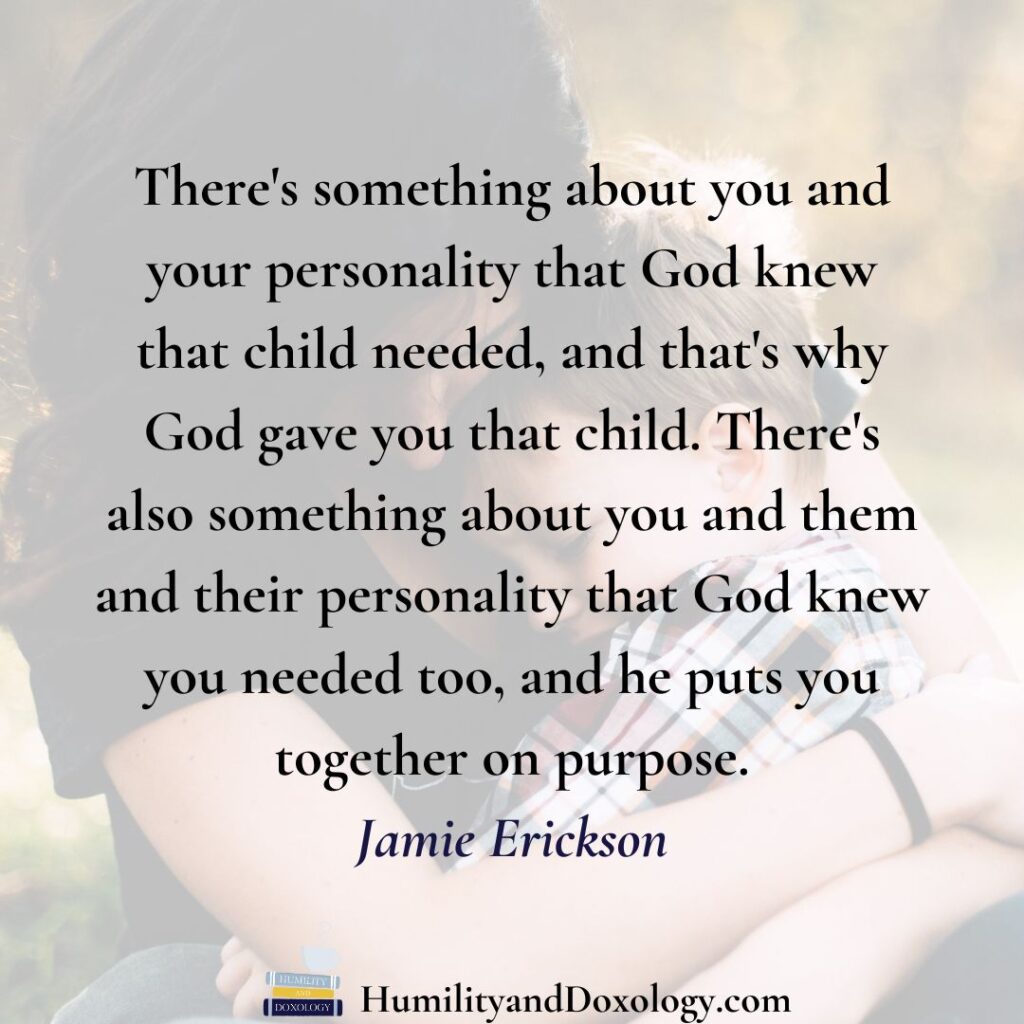
If we weren’t homeschooling, would we still struggle with our kids?
Amy: One of the challenges I think that we can sometimes face, maybe I should just say I have sometimes faced it, is occasionally, I know it’s hard to imagine, that my children don’t always obey. They’re not always respectful some days. Even though I’m a homeschool mom and I’m writing about homeschooling, I was homeschooled myself, I love it, sometimes I don’t really necessarily want to be with that particular kid on that particular day.
It can just seem like it would be so much easier, it would solve all our problems if they were just out of the picture. I know that’s not really true. What would be your encouragement to a mom who’s maybe feeling that pressure of if the child just weren’t homeschooled, if they were just out of the house, we wouldn’t have these struggles?
Jamie: I think you just gave the resume of 107% of homeschool moms.
I don’t know of a homeschool mom who doesn’t have a difficult child. Difficult is a very general loose term that can mean a lot of things. Sometimes it could just mean you have personalities that clash at times or maybe you have personalities like in the case of my daughter and I, and she wouldn’t regret that I mentioned this, she and I have such similar personalities that through the years, that was sometimes a struggle.
Yes, we all have that one child, but I guess my answer would be you aren’t really addressing the issue by sending them off to a public school. You’re just merely putting duct tape over it.
It might be a quick fix that alleviates the struggle for the short term, but eventually, that struggle as that child gets older and matures and gets physically bigger, emotionally larger, that struggle is going to get larger too if it’s not dealt with. You can’t just put a Band-Aid over a struggle. They’ll bring that struggle home with them and you will end up in the evening and in the weekend with that struggle still not really being able to address it because character struggles take time. Personality vents take effort. You have to lean into that as a mom. You have to do the hard work.
I think many times when kids are just sent off to the public school, all of those struggles get exacerbated because of, like we had mentioned before, some of those social pressures being in a peer environment, being in an overstimulating environment. If you, on the other hand, were to keep them at home in the greenhouse of your home, I can guarantee you that some of the days will be really, really hard, I’m not going to sugarcoat it, but hard is not necessarily bad. Think about all the things that are hard in our lives. Marriage can be hard. A career can be hard. Having children can be hard, but most of the hard things in life are actually the most worthwhile things. It just requires some effort.
I guess I would say there’s something about you and your personality that God knew that child needed, and that’s why God gave you that child. There’s also something about you and them and their personality that God knew you needed too, and he puts you together on purpose. While it would be really easy to just wave the white flag and send them off somewhere else to let someone else do the work, that work is yours to do and it takes time and it takes an investment. That time and investment cannot happen deeply if you send them off for somebody else to do the work.
Amy: I think a lot of times the difficulty can come when we’ve put our hope into the homeschooling, that’s the foundation for our hope, because we have this idea, “If I just homeschool, then my children will always obey and will always be happy, and everything will turn out just fine because homeschooling will save my children.” That is not the way life works. Homeschooling won’t save your children. You need the Holy Spirit for that to work in their hearts.
When we shift our identity onto, wow, this method of home education as the thing that will make everything happy all the time, and then things are sometimes hard, or we’re not just having this blissful day with unicorns and rainbows every morning with our kids, then we’re thinking, “Is this the wrong choice? Am I doing something wrong?”
There may be things we need to repent of and certainly be sanctified in that, but a lot of times, it’s just in that hard, that God’s doing the hard work of changing our hearts and of changing our children’s hearts. I think it does no one any good to sugarcoat and have this idealized view of homeschooling that everyone’s always happy and your children are always well-behaved.
Jamie: I actually think it does the opposite. When you are in a house for 10 to 12 hours a day with somebody, it actually brings to light all of the brokenness that is already there, but that’s a good thing. We can’t see that as a bad thing because those issues can never be addressed if they’re just shoved under the rug. You can shove all kinds of issues under a rug, but eventually, you’re going to trip over that big mound that’s under the rug. It has to be addressed. Actually, homeschooling brings so much of our brokenness. We’re imperfect people in an imperfect world raising imperfect kids. Homeschooling actually allows some of those things to come to light, but I agree, homeschooling is not the salvation of anybody.
I would also say it’s a real naive posture to take to assume that homeschooling is only going to be unicorns and rainbows because homeschooling has its own share of struggles and its own share of strengths. In choosing homeschool, you’re actually saying, “These are the struggles and strengths that God wants me and my kids to have.” I think no matter what educational choice you choose, you’re going to have struggles and strengths, but we’d all do well to prayerfully consider, “Lord, what are you going to use in my life and in my kids’ lives to refine us and make us into the more completed us, the more us that looks like you?” For some of us, that’s going to be homeschooling.
Amy: I just like to say that homeschooling is the best hard thing that I do. [laughs]
Jamie: Yes. One of the best for sure.
Fighting fear as a homeschooling mom
Amy: Definitely. I think that a lot of us can come into homeschooling with a lot of fear and anxiety, or maybe even a fear of homeschooling that is keeping a mom from considering it. Why do you think fear can bind us up as we think about homeschooling, and are those fears valid?
Jamie: I think the easiest answer to that is just that that’s not our lived experience. Most of us didn’t homeschool and so our experience is a traditional model. That’s what we know. Anytime we have something unknown or new, there is an element of fear to it. When you’re stepping into unknown territory, you can often feel like a pioneer. Now, I would not say that anybody homeschooling right now is a pioneer, but you’re a pioneer in your home just stepping out doing it for the first time if you are a first-generation homeschooler, and that’s going to bring some element of fear.
I also think that our culture places too high a value on certifications like teaching degrees, and moms think that if I don’t have a bunch of letters behind my name, if I don’t have a piece of official paper that says I’m a trained teacher and the government has stamped their sanction on my abilities, then who are we to say we can educate a child? I also think that mothering itself comes with a certain amount of fears. Any mother can tell you a lengthy list of fears she has for her kids. Then you add the overwhelming or sometimes overwhelming responsibility of educating that child on top of all those regular mothering fears, and then those fears just become ballooned.
I think that while it’s natural and normal to have some of those fears, I don’t really think that there’s any relevance or grounding for them, I think that’s just the tool of the enemy to try to get you to not homeschool. We know that homeschoolers score on average in the 87th percentile of normative tests despite the fact that most families are on a limited budget. They don’t have a billion-dollar budget at their disposal to buy all the educational must-haves.
Despite the fact that most homeschooling moms don’t have a certification in teaching, despite the fact that they have lots of apprehensions to know how to do it right, homeschooling and homeschoolers are far excelling in academics. That’s just the nuts and bolts. That’s the black-and-white facts of it. I think that some of our fears can be alleviated by looking to you and my husband and all these other second-generation homeschoolers who are regular contributing members of society who are passionately involved in their communities and in their workplaces. They work out civic responsibility in front of everyone.
10, 20 years ago when my mother-in-law was homeschooling and she was one of the pioneers, her fears maybe were a little bit more palatable or easier to understand because there wasn’t a proof that this thing was going to work out. It was a grand experiment, but we’re beyond the experiment phase now. We have a whole generation have grown adults who are proof that this thing works.
You might not be able to homeschool perfectly, none of us can, but God is able to orchestrate the perfect homeschool for you and your kids. Not a perfect one, mind you. Hear me. It’s the one that is perfect for you and your kids, and that will include struggles because that’s part and parcel for living on this side of the garden. If we let Him, God will lead our homeschooling day and it will be perfect and then someday our kids will be the proof that it works.
Amy: I love the way you emphasized that it’s the perfect homeschool for your family, not the perfect homeschool because I think a lot of times, we can look at one particular family or this example and the other and we think our family has to look just that way and if we don’t look just that way, then somehow we aren’t living up to some imaginary ideal. That’s just not the case. That’s one of the gifts of homeschooling, in fact, that we can find what’s going to work best for our own unique families. I think it’s so valuable to listen to the stories of the people who really did go in that first generation and figure all this stuff out. I joke they were doing it without the internet. How did they homeschool before the internet?
We actually did a special homeschool generations series where I interviewed a bunch of homeschool parents from my mom’s generation, got their stories and the things they learned. I interviewed then a bunch of other second-generation homeschoolers and our experience, and how that’s playing into our homeschools now. I think that’s really encouraging just to hear. We may not know how to pronounce words correctly because we learned our vocabulary from reading so sometimes I’ll still come out with a word that’s mispronounced, but that’s okay.
Jamie: I can tell you that as a teacher in the classroom, I had plenty of kids who really struggled to spell because they were taught to say words incorrectly based on the dialect of where they were from. It’s not just a homeschool problem, is what I’m saying.
Encouragement for the overwhelmed mama considering homeschool
Amy: It’s not just a homeschool problem. Okay, good. We have this fear of homeschooling as maybe being too scary. We’ve alleviated that one, but what about the mom who’s like, “I think homeschooling sounds great. It doesn’t sound scary. I just am already overwhelmed. I feel like I’m not even doing a good job just all the other mom and life and keeping the house running, stuff I’m supposed to be doing.” How is that mom supposed to now add home educating to her list of to-dos?
Jamie: I think first and foremost, you can’t borrow trouble. I did that in my early years. I looked ahead to the years I’d be having to teach upper math skills. I wasn’t there yet in the same way that I can’t fear having baby number five when I’m only on baby number one.
God will give you exactly what you need when you need it. I think sometimes that really is the struggle with moms. It’s not our overwhelming busyness, it’s we look at the busyness that we have right now and we add in all this other busyness that we think is going to come not realizing that your kids grow with you and so your busyness will change and will ebb and flow.
I think also many moms who have started out in the public school and have transitioned to homeschooling will confess to actually being less busy. The busy that they do have in their lives of homeschooling is actually a busyness of their own choosing. What I mean by that, when you have kids in the public school, you think, “Oh, somebody else is teaching them and then they come home.” What happens when they come home is you’re doing homework with them for hours after school. This is homework at the end of the day when you are tired and you are spent, you have no more gas in the tank, you are having to tutor to someone else’s teaching style and ways of teaching like common core math.
I didn’t learn common core math. If I had to teach it, I’d be like, “Hard pass. This is how I do Math.” To be able to or to have to tutor someone in that would be painstaking for me. You’re having to teach to somebody else’s standards. I think that you’re having to come into a subject right in the middle of the subject. You’re not ramping up to it and learning right alongside your kids. Oftentimes, that busyness is a different kind of busyness when you have your kids in the public school versus if you are teaching your kids, you get them at the very best part of the day and they get you at the very best part of the day.
You are actually proactively teaching and not having to reactively retrain. You get to teach them regular old math or whatever it is you want to teach versus the way somebody else is wanting them to learn, and you get to have a long runway of learning right alongside them. You get to start out with the basic fact and add on to the next fact. You’re not just thrown into the deep end having to remember all of these things that it’s been years since you’ve learned.
I think sometimes we can look at homeschooling and think, “I can’t do that, that will make me so much more busy than I already am now.” I would argue that it’s the opposite. It’s when you have your kids in school and you’re racing out the door to get them to school or to pick them up from after-school activities, bundling up all of your younger ones, waking them up from naps to go pick up your older ones, whatever, all the chaos that happens when you have to live half of your life outside of your house, I think that’s a different kind of busy. It’s a busy of not your choosing.
Amy: There’s something very powerful about getting to choose your own busy, right?
Jamie: Right.
Amy: The things that are your family’s priorities are the things then you’re going to choose to invest your time on. It’s a lot harder if someone else is telling you, “No, I don’t really care about your priorities. They got to do things my way.”
Jamie: Right. Just the fact that you’re expelling so much energy retraining your kids at the end of the day, it really does require so much more effort and energy to retrain than it does to train.
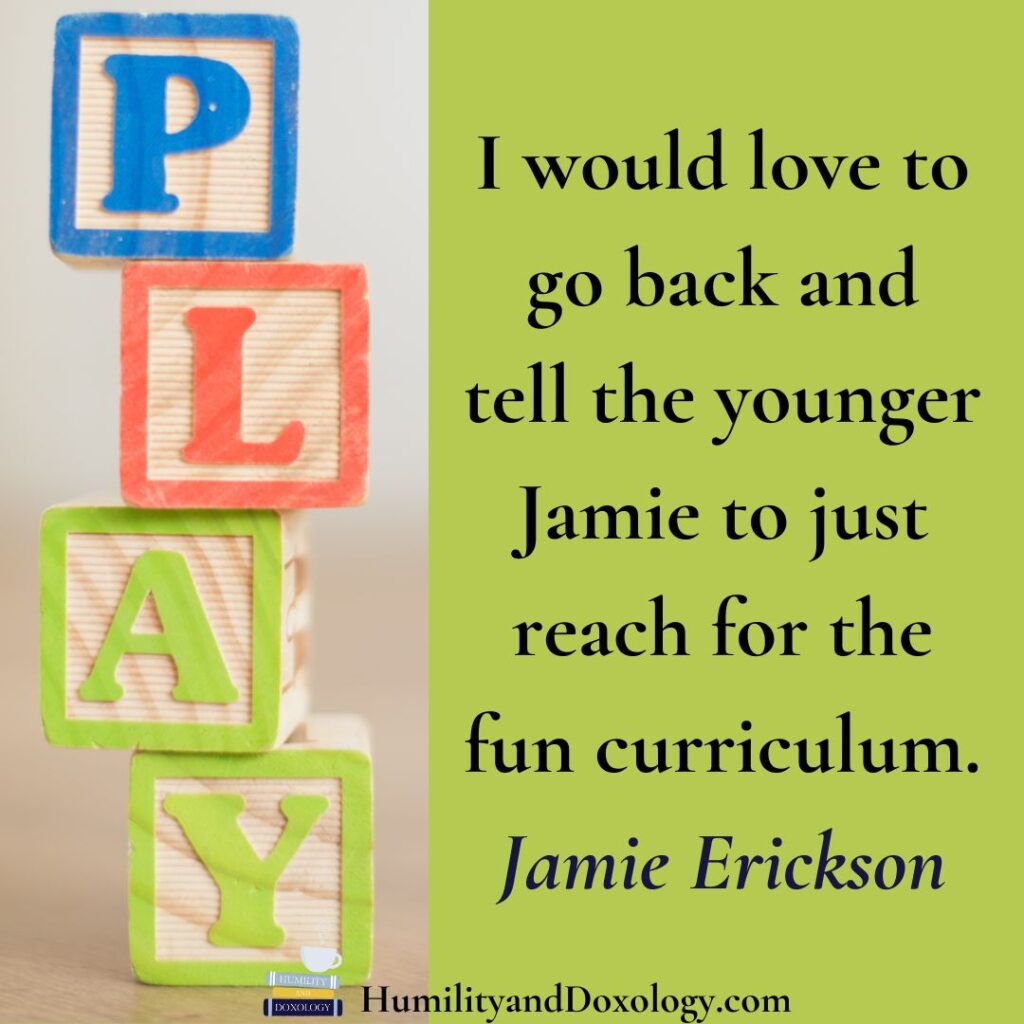
Jamie’s advice for the new homeschool mom
Amy: Jamie, this has been so encouraging already. So many tidbits moms can take away, but I’m always curious when I talk to moms who have been homeschooling for a while, especially moms who have graduated a student, what do you wish you could go back and tell your new homeschool mom self? What advice would you give to yourself?
Jamie: That’s such a great question. I wish I could do that actually. I would say to my younger Jamie, pick the fun curriculum. In those early years when I was starting out, and most of my decision-making came from the fact that I was conditioned as a trained teacher to believe school had to look one way, I didn’t pick the fun curriculum. I chose the rigorous curriculum because, oh, she’s in kindergarten, it has to count, it has to be meaningful, she’ll get far behind. You know what? I’ve been doing this long enough to know that I should have picked the fun curriculum because all of that rigor will come.
You have such a short window to be able to not just do the fun things but to be able to have kids young enough to want to do those fun things with you because when they get to the teens year, they’re past all the unit studies and the messy projects and all the fun things that make homeschooling so enchanting. I guess I would love to go back and tell the younger Jamie just reach for the fun curriculum. Studies show that apart from math, which is more systematic, you have to learn one skill on top of another skill. Apart from math, every other subject can actually be learned and learned well in the last three or four years of your homeschool.
You might say, “Oh, she’s in first grade, it has to count.” This isn’t license to just throw your hands up and be a lazy homeschool mom, but hopefully, this will ease us all back a little bit and dial back the angst and the fear. If you don’t do a single thing from first grade all the way till, say, high school, they’ll still be okay. I am a published author right now and I didn’t learn a stitch of grammar. I didn’t know what a noun or a verb was. I didn’t know how to write a proper sentence until I was in the seventh grade, but I learned it when I needed it. I guess I would just say, “Jamie, dial back the angst and just reach for the fun.”
Amy: You know with that fun, I shouldn’t say you can’t, but it’s a lot harder to teach that wonder, that delight, that excitement-
Jamie: Enchantment.
Amy: -for learning. Yes, it’s the enchantment. It’s a lot harder to teach that later than it is when they’re already primed to just think anything you learn and explore is fun when they’re little, right?
Jamie: That’s right.
Amy: To build that, to grow that love of learning is going to be invaluable later on than when they have to go a little deeper into whatever areas they need to study.
Jamie: Yes. You’ve already primed the pump and you’ve pointed their feet in a good direction. Then when you have established enchantment and delight, man, they will learn it with or without you.
Amy: Yes. Sometimes it’s really interesting the things my older kids have just discovered that they’re interested in. I’m like, “Look at you figuring that out yourself, watching the YouTube videos, reading the books.” It’s really fun to see them coming into their own as unique people.
Jamie: Absolutely.
What Jamie is reading lately
Amy: Here at the end, I’m going to ask you the questions that I ask all of my guests. the first one is just what are you personally reading lately?
Jamie: I’m reading three different things. I will give them to you really quickly, the cliff notes. I’m reading a book called The Pagan Church, which just talks about the pagan roots of so many of our American church practices, and in light of that, what are we to do with that? As 21st-century American Christians, what are we to do with that knowledge?
Then I am reading a book called I Will Always Write Back. It’s a true memoir about two middle schoolers. One was an American white girl and one was a boy in Zimbabwe. They were paired up as pen pals in middle school. It’s the story of how their life absolutely changed with just the passing back and forth of letters, getting to know each other’s perspectives and lived experiences, getting to build in each other an empathy and an understanding. It’s a really great book.
Then I am listening to a book called Listen to the Moon. It’s a middle-grade fiction, lower end of YA. I lead a tween and teen book club for my son and his friends. That happens to be the book that we’re reading. It is about a girl who was shipwrecked when the Lusitania sunk in World War II. She was shipwrecked on the coast of a very small British village. Through a series of circumstances, everybody in that village thinks she is a German. It’s the unraveling of all of those things in this young girl’s life.
Amy: Oh, wow. All three of those sounds really fascinating. I’m going to have to see if my library has any of those.
Jamie: Highly recommend them. Yes.
Jamie’s best tip for helping the homeschool day run more smoothly
Amy: Oh, the final question I have for you is, what is your best tip for helping the homeschool day run more smoothly?
Jamie: Definitely establish good habits. Establish a rhythm to your day. Not necessarily a set schedule like at eight o’clock we’re going to do this, and then 8:30, we’re going to do that. Just a rhythm, a routine to your day. Establishing where you’re going to store things, what do your kids do when mom has to be called away to do something apart from homeschooling like throw in a load of laundry or just be a real human being for a second?
What are they going to do when they’re all done with their school and they have some free time? Just establishing those rhythms and routines, establishing good habits will really set the course of your homeschool day. Then if things go off the rails as they do because, again, we’re imperfect people living in an imperfect world, you’ll be able to hop back on those rails a little bit easier because the rhythm and the routine has already been established.
Amy: Such good advice. Yes, habits and the rhythm and routine can be so valuable, and I think are actually a lot easier to follow and to stick with than a strict timed schedule because you’re always– I don’t know. I always get off a strict time [chuckles] schedule and then I feel behind.
Jamie: Right. A routine is the grace that you need to have longevity in this. A schedule feels like someone apart from you is bossing you [laughs] around and nobody likes that. You feel restricted, and eventually, you give up on the thing because you just can’t do it anymore.
Find Jamie Erickson online
Amy: Jamie, this has been so wonderful. Thank you for taking the time to chat with me today. Where can people find you all around the internet?
Jamie: I think the easiest place is just to go to jamieerickson.com. That’s where you can find my podcast and my blog and my books. I’d love to meet you.
Amy: Yes. I will have a link to your site in the show notes for this episode over at www.humilityanddoxology.com. I look forward to chatting with you again. Thank you, Jamie.
Jamie: Thank you so much for having me.
Check out all the other interviews in my Homeschool Conversations series!
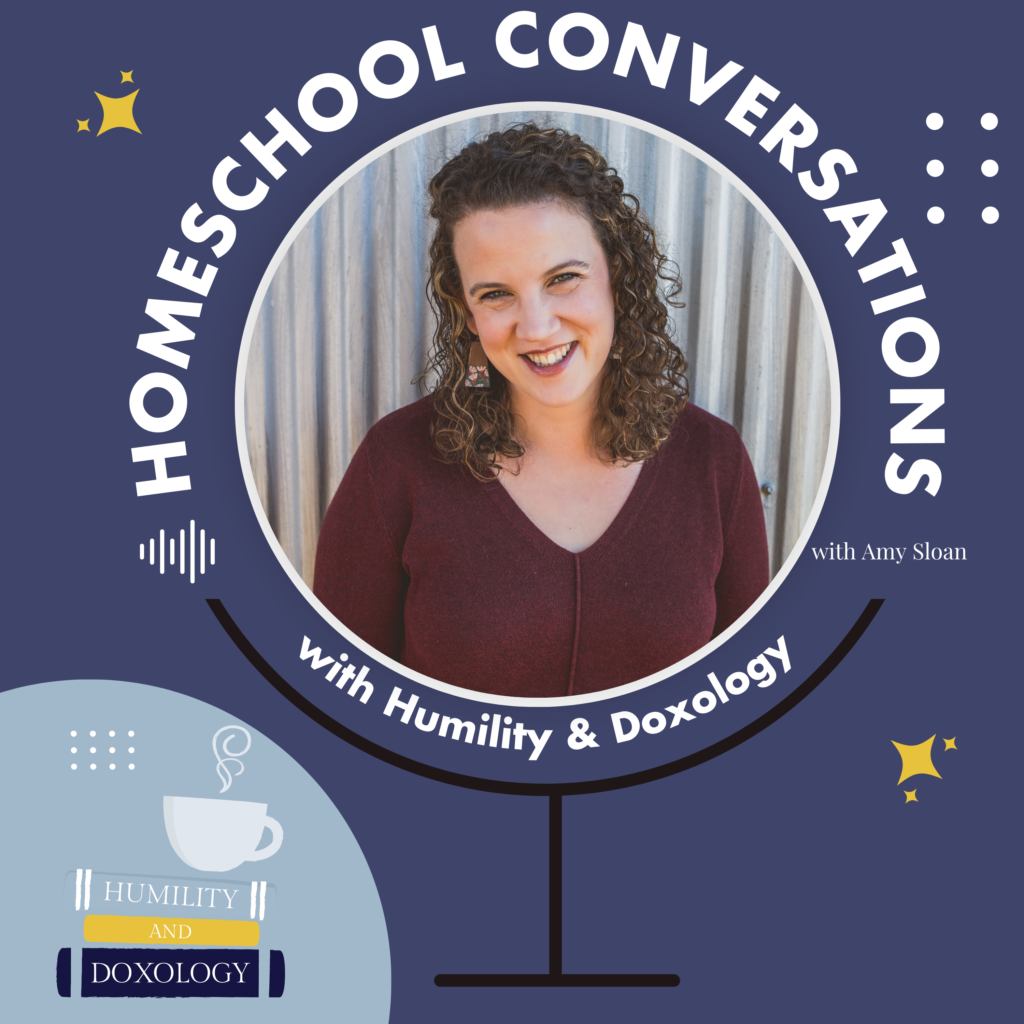

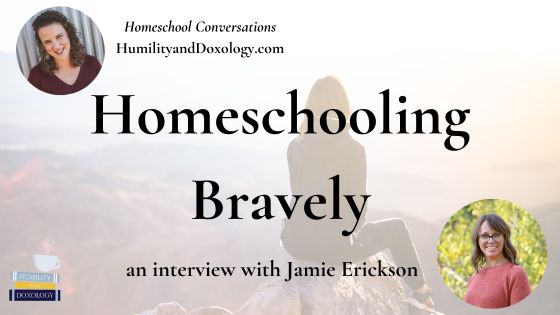


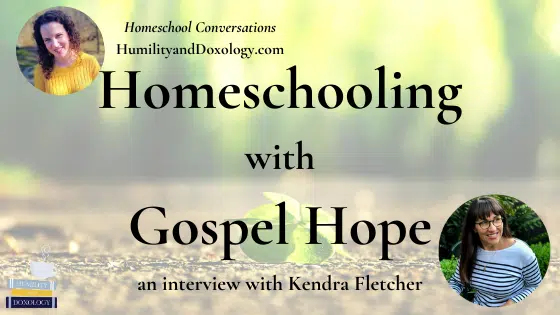

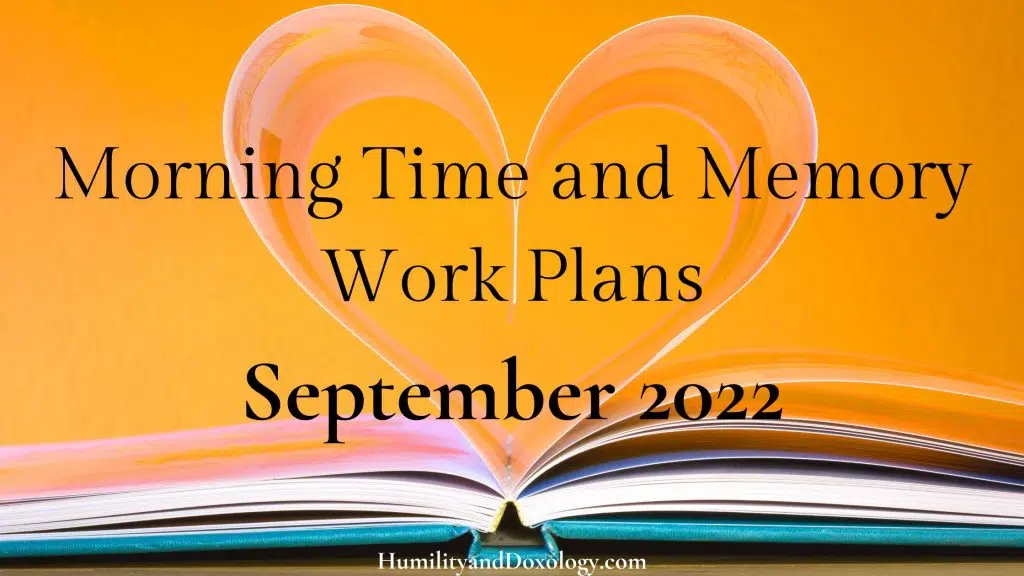
I loved this episode. It left me wondering: when Jamie encouraged parents to “reach for the fun curriculums,” what are some curriculums she’d consider “fun” I could try? (I’m hoping to begin homeschooling for the first time this fall.) Thanks!